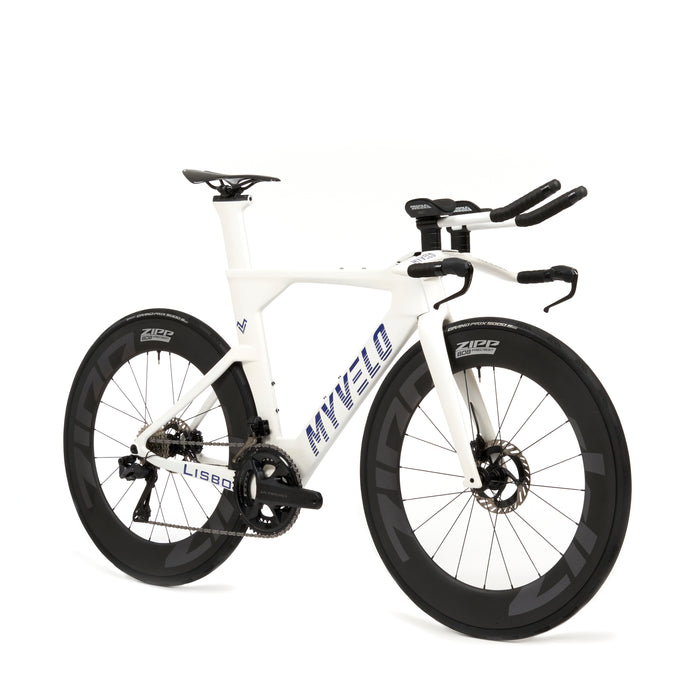
Lisboa triathlon bike
incl. FREE shipping & free returns

The "French valve", also known as "Sclaverand valve" or "Presta valve", is a type of valve commonly used in bicycle tires. It is named after its inventor, the French cyclist and valve manufacturer René Sclaverand . The French valve is characterized by its sleek shape and its specific mode of operation.
The French valve consists of a thin metal tube with a thread at the top end that is inserted into the valve hole of the rim. The valve is secured to the bottom end of the rim by tightening a nut, creating an airtight connection. There is a cap at the top of the valve that serves to protect against dirt and moisture and is removed during inflation.
To let air into the tire, the cap must be unscrewed. A special valve core is pushed in slightly to allow air to pass through. When the tire is inflated, the air from outside pushes the valve core down, and when the desired pressure is reached, the valve core is closed by the elastic force of an integrated rubber membrane.
Thin construction: The slim profile of the French valve allows for smaller valve holes in the rims, resulting in less material removal and thus increasing the stability of the rim.
Higher pressure: The French valve can handle higher tire pressures, making it a popular choice for road bikes .
Tight closure: The valve closes automatically and tightly, minimizing air escape and allowing easy inflation.
Narrow Rim Compatibility: The slim design of the French valve makes it ideal for narrower rim profiles.
Special pump head required: Many standard bike pumps come with a larger pump head for Schrader valves. An adapter or special pump head is required to inflate the French valve.
More sensitive: The French valve can be more sensitive and more prone to damage than Schrader valves.
Bleeding when screwing on the cap: If the valve cap is not tightened properly, there may be a slight escape of air.
Schrader valve: The Schrader valve is more robust and is often used in car valves . It does not require special pump heads, but its larger design can affect the rim profile.
Blitz valve (Dunlop valve): The Blitz valve is a compromise between Schrader and French valve and requires a special pump head. It is common on city bikes and Dutch bikes .

Wenn in München die Wiesn-Zeit beginnt, heißt es wieder „O’zapft is!“. Millionen Besucher strömen jedes Jahr zum Oktoberfest, um bayerische Tradition, Tracht, Bier und Gaudi zu genießen. Doch während Festzeltstimmung und Fahrgeschäfte locken, stellt sich schnell die Frage: Wie kommt man am besten hin und wieder sicher nach Hause? Eine clevere Antwort darauf ist: mit dem Fahrrad!

Radfahren ist weit mehr als nur Sport oder Fortbewegung – es ist auch ein soziales Erlebnis. Immer mehr Radbegeisterte schließen sich sogenannten Social Rides an. Dabei geht es nicht um Bestzeiten oder knallhartes Training, sondern um Gemeinschaft, Spaß und geteilte Leidenschaft fürs Rad.

Sarcopenia – this medical term refers to a very real problem: the age-related loss of muscle mass and strength. Starting around the age of 50, the body loses up to 1–2% of its muscle mass annually. The consequences: weakness, unsteadiness when walking, and the risk of falls. But this doesn't have to be the case. Exercise is the best remedy for muscle atrophy – and this is precisely where the e-bike comes in. It enables regular, joint-friendly muscle training even in old age – without overexertion.